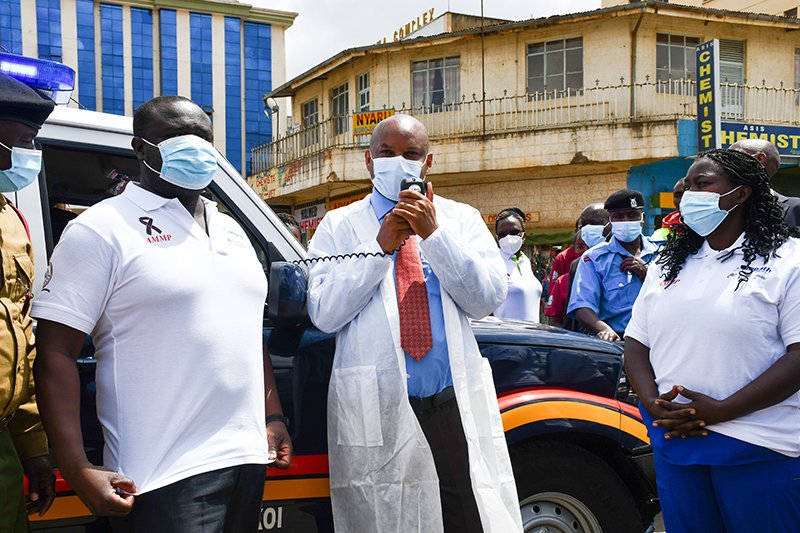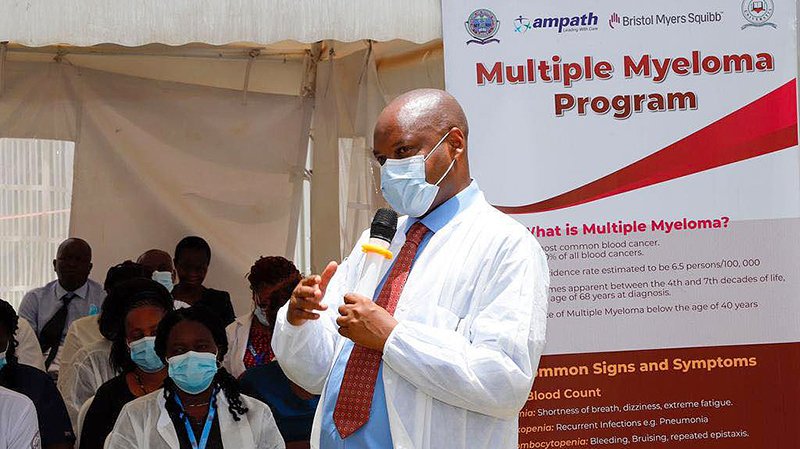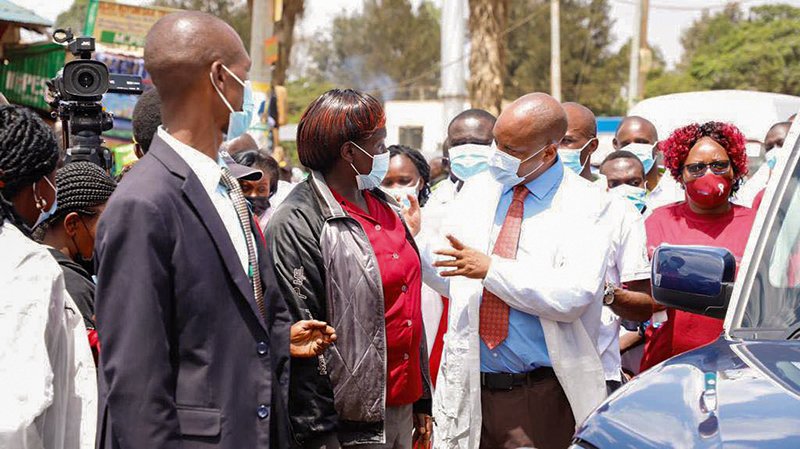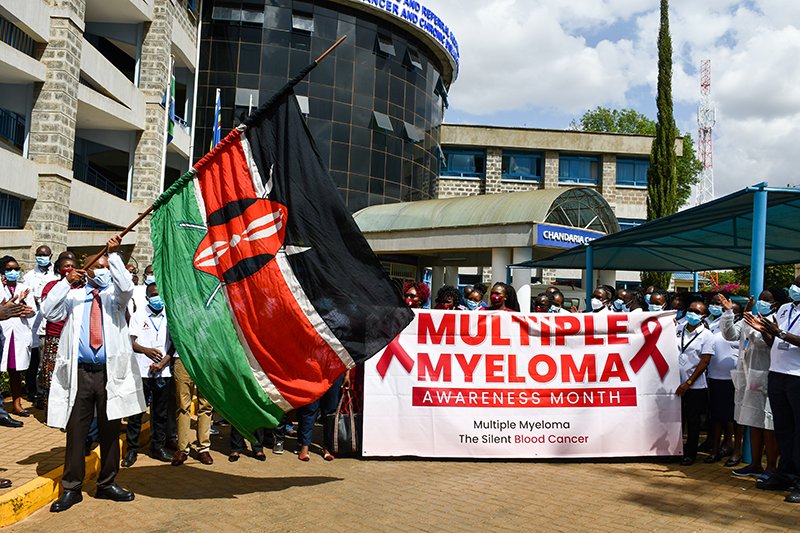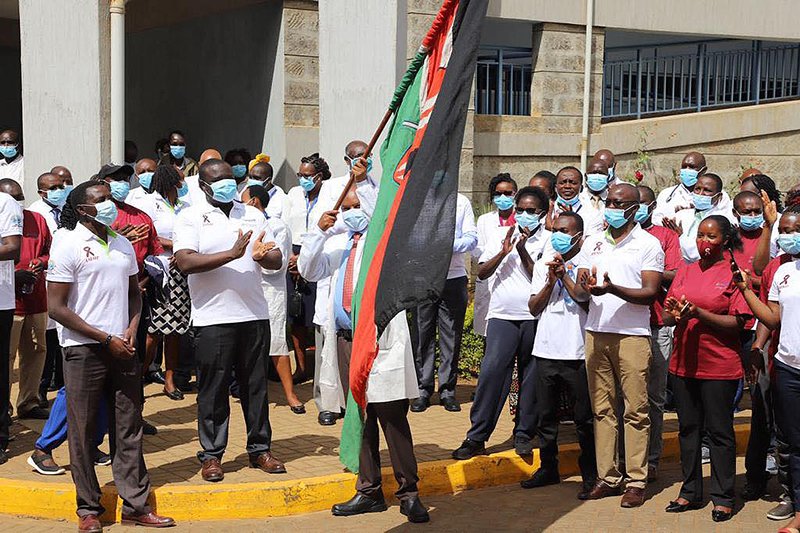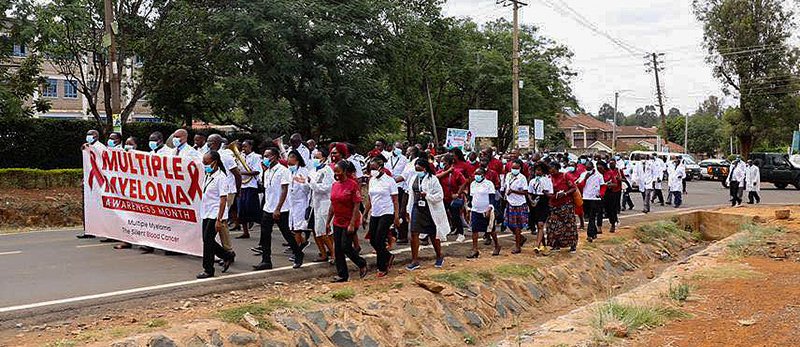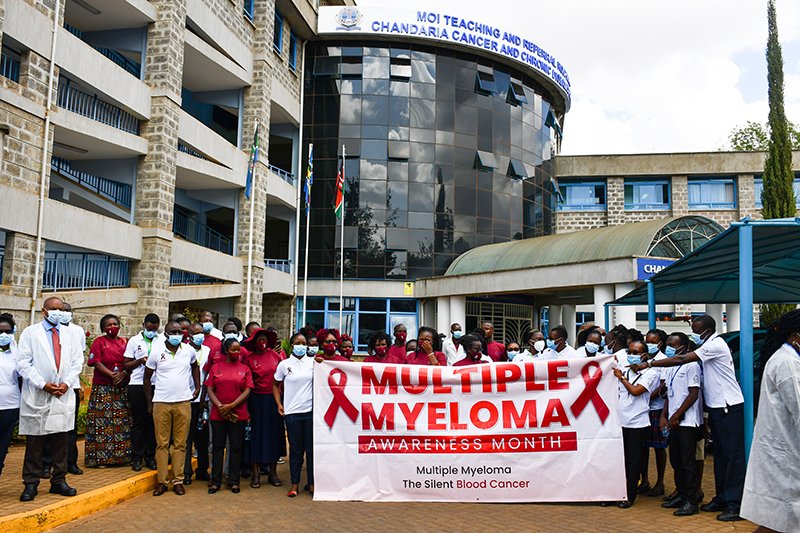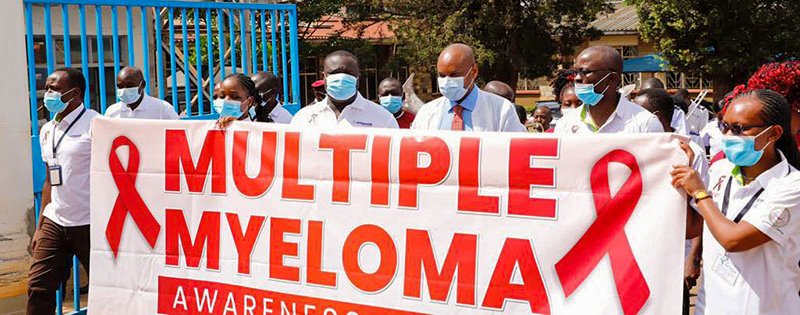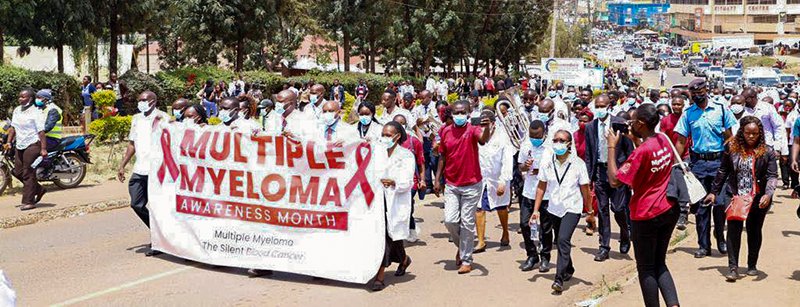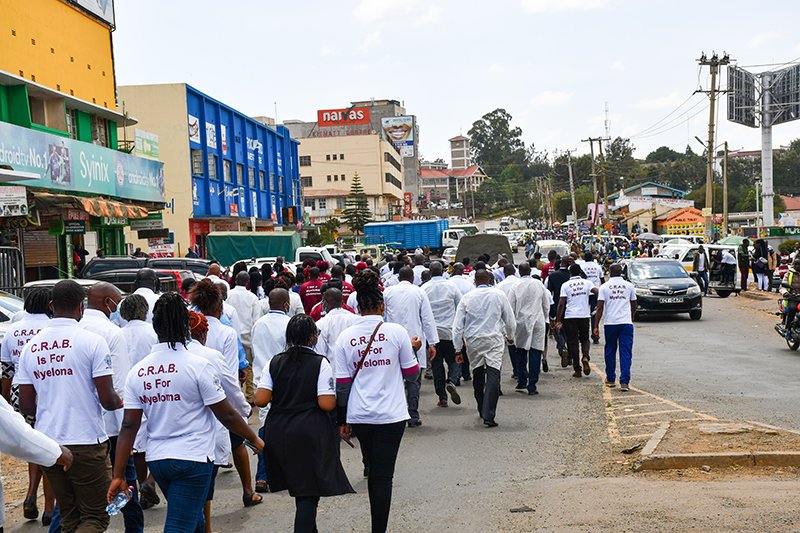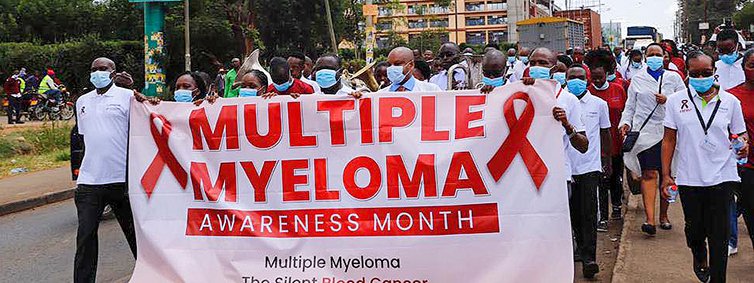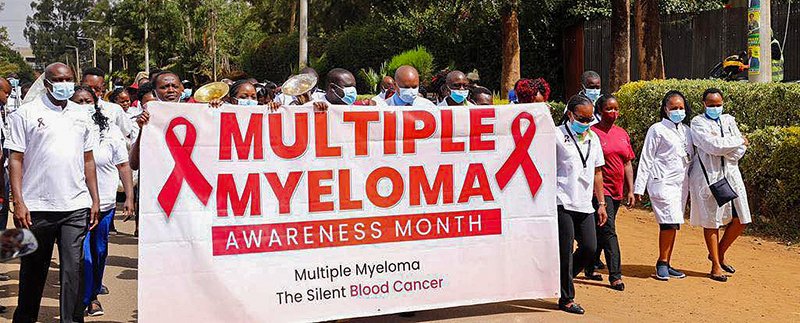Multiple Myeloma Program Promotes Awareness
Multiple Myeloma (MM) Awareness month shines a spotlight on the detection and treatment of the rare blood cancer. The AMPATH Multiple Myeloma program, in conjunction with Moi Teaching and Referral Hospital, organized an awareness walk in Eldoret to raise awareness of the risk factors and earlier identification of symptoms for early treatment.
The Multiple Myeloma Awareness walk begins at MTRH.
Addressing the community and the media during the walk on March 14, MTRH CEO Dr. Wilson K. Aruasa MBS, EBS, urged all to be vigilant on identifying the symptoms of this cancer for early diagnosis and treatment. “Ours is to create awareness because we need everyone, right from the family level, the community level, and the lowest levels of the health care systems, to know the signs to look out for and the appropriate diagnosis for a referral.”
The acronym CRAB summarizes the most typical clinical manifestations of multiple myeloma:
Calcium elevation (hypercalcemia which is higher than normal blood calcium levels.)
Renal insufficiency (kidney failure),
Anemia
Bone abnormalities.
These symptoms are often confused for other ailments even by health care providers.
Emphasizing the disease manifestation, Dr. Teresa Lotodo, lecturer, pathologist and principal investigator of AMPATH’s Multiple Myeloma program, said “Myeloma is referred to as silent blood cancer because it presents itself in hiding. It may have multiple presentations that may be confused for any other ailment. The fatigue, the bone pains and the kidney issues--all this may not be flagged easily during the hospital visits as multiple myeloma.”
World over, this malignancy accounts for almost 10 percent of blood cancers but is more common for Africans. Other risk factors include advanced age, manifesting more in men, and those working in petroleum-related industries as well as farmers due to specific agricultural exposures.
In 2021, Chandaria Cancer and Chronic Diseases Centre (CCCDC) at MTRH had this as the fourth most common malignancy. Over the past years, the cancer center has diagnosed 382 patients and has 156 active patients on follow-up for multiple myeloma. Lab tests to diagnose multiple myeloma including checking for abnormal protein in the blood and urine, bone marrow and imaging. The treatments available at MTRH include chemotherapy, radiotherapy and supportive care.
The 5km walk provided an excellent opportunity for the staff from AMPATH and MTRH and the multiple myeloma caregivers and patients to interact and share their knowledge and experiences with the public. Advanced stage disease diagnosis was highlighted as one of the most significant challenges that cause very high mortality rates. The cost of treatment remains a serious concern for patients and their families, primarily because the National Hospital Insurance Fund does not fully cover treatment costs
Grace Ameli, a caregiver to one of the MM patients being cared for at MTRH, shared her story: “I am glad we had insurance cover (NHIF) when we started the treatment because it has really helped us. The challenge we experienced was that several times, the NHIF cover got depleted and we were forced to start looking for money to pay for the remaining chemotherapy and care as a whole. The AMPATH Multiple Myeloma program has been supportive and has helped us shoulder some of these costs.”
Despite the challenges, she encourages the caregivers, “This is to my fellow caregivers: be strong, patient, and present in your patient’s journey. Don’t take things personally and always ask for help if you feel exhausted.”
Austin Omondi, the clinician who attends to the patients at CCCDC, emphasizes the continued need for advocacy for the support of the MM patients. “Multiple myeloma patients go through many psychological and psychosocial challenges from many sources such as rejection by family and friends, financial constraints, treatment side effects, extended treatment periods and others. There is still a need for advocacy and awareness on myeloma screening for early diagnosis and identification of the premalignant state for a better outcome, treatment, and support. The government should also have an inclusive insurance package for diagnosing and treating myeloma.”
The AMPATH Multiple Myeloma program coordinator, Mercy Oduor, acknowledges the noble role played by the program. “A cancer diagnosis is always a turning point to anyone’s life. The diagnosis brings about anxiety, uncertainty, distress, and depression. Over the past 10 years, the AMPATH Multiple Myeloma program has grown and transitioned to respond to an unmet needs among myeloma clients seeking care at MTRH in Eldoret.”
The Multiple Myeloma program is built on four pillars:
Patient care--dedicated to facilitating diagnosis, treatment and follow-up of multiple myeloma patients.
Patient support--needy clients are assisted to get timely diagnoses and appropriate treatment. The clients are assisted to enroll with the National Health Insurance Fund (NHIF), routinely travel for review by a hematologist, and organize and hold support group meetings.
Training and sensitization-- targets healthcare workers at MTRH and county hospitals and community health workers (CHWs) in order to increase the index of suspicion for multiple myeloma and improve early-stage disease diagnosis.
Dissemination of information--sharing the program experience through research publications, mass media platforms including radio talk shows, conference presentations and social media platforms.
The AMPATH Multiple Myeloma Program Partners with the Ministry of Health- Departments of Non-Communicable Disease, National Cancer Institute, Moi University-College of Health Science. Indiana University, Bristol Myers Squibb Foundation (BMSF), county hospitals in western Kenya (Kakamega, Busia, Kericho, Elgeyo Marakwet, Migori, Nandi, Bomet, Kilifi, Kisii, Bungoma, Homabay, Trans Nzoia, Turkana, Uasin Gishu, West Pokot, Busia, Siaya, Nakuru, Kisumu) and the clients/patients
The program is led by Dr. Lotodo and Dr. Terry Vik is the co-principal investigator. The program staff includes: Dr. Beatrice Jepngetich Melly, clinical hematologist; Ms. Mercy Oduor, program coordinator; Mr. Austin Omondi, program clinical officer; Mr. Ndenga Indangala, research nurse; Ms. Yvette Oyolo Lorraine, social worker; and Ms. Diana Flora Namaemba, M & E officer and biostatistician.
